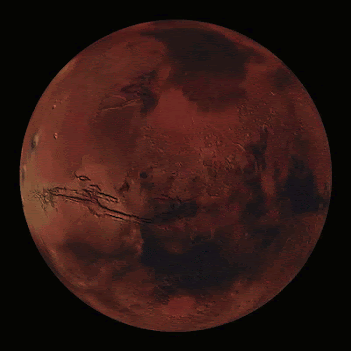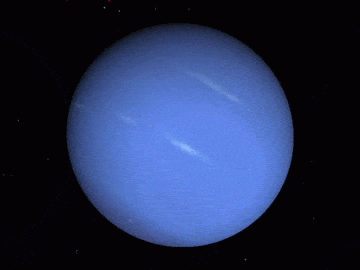Mars
 |
| [1] Mars |
With an average temperature of between -87 to 5 degrees celcius, Mars is a much cooler planet than Earth (temperature ranges between -25 to 45 degrees celcius). The reason for this lower temperature range is due to the fact that Mars has 1/6 of the atmospheric pressure that Earth does therefore making it more difficult for the planet to retain heat, thus resulting in cooler temperatures being recorded on Mars compared to its neighboring planet Earth. Unlike Earth however that has one moon orbiting its atmosphere, Mars has two moons; Phobos and Deimos which "bear more resemblance to asteroids than to Earth's moon. Both are tiny - the larger, Phobos, is only 14 miles across, while the smaller, Deimos, is only 8 miles, making them the some of the smallest moons in the solar system" [5]. Another interesting fact about Mars is that it has "approximately the same landmass" [2] as Earth even though it is approximately half the size of its neighboring planet. The reason for this is due to the fact Earth is mostly composed of water (70%) and so "even though Mars has 15% of Earth's volume and just over 10% of the Earth's mass" [2], Mars still contains the same amount of landmass as a result.
In terms of space exploration, Mars is a risky and unforgiving planet to fail landing on. With "more than two-thirds of the 40-odd missions launched towards Mars being lost due to failed components, rocket glitches or grievous errors" [6], this planet doesn't exactly have the best record for completing a successful mission. The most recent probe to be launched to Mars and expected to land on the 18th of February 2021 is the 'Mars 2020 Perseverance Rover' which aims to "look for signs of past microbial life, cache rock and soil samples, and prepare for future human exploration" [7]. Overall, with many more missions to come, Mars is a planet that many astronomers believe might have had or still has some form life living on its surface and therefore is more important than ever to have successful missions that help solve this question.
References:
[1] gifer.com. [n.d.]. Mars Gif. [Online] Available at: https://gifer.com/en/DPvp [Last Accessed 16/10/2020].
[2] Jones, C. [2020]. Mars Facts. [Online] Available at: https://space-facts.com/mars/#:~:text=Mars%20is%20the%20fourth%20planet,composed%20primarily%20of%20carbon%20dioxide. [Last Accessed 17/10/2020].
[3] Wolchover, N. [2012]. Why is Mars Red?. [Online] Available at: https://www.space.com/16999-mars-red-planet.html [Last Accessed 17/10/2020].
[4] Concerning Facts. [2018]. Why is Mars Red?. [Online] Available at: https://www.youtube.com/watch?v=7R5uuZwTnXI [Last Accessed 17/10/2020].
[5] Redd, N. [2017]. Mars' Moons: Facts About Phobos & Deimos. [Online] Available at: https://www.space.com/20413-phobos-deimos-mars-moons.html#:~:text=Identity%20crisis,moons%20in%20the%20solar%20system. [Last Accessed 18/10/2020].
[6] Malik, T. [2020]. The best (and worst) Mars landings of all time. [Online] Available at: https://www.space.com/10930-mars-landings-red-planet-exploration.html#:~:text=Reaching%20Mars%20is%20a%20hard,or%20missing%20the%20planet%20altogether. [Last Accessed 18/10/2020].
[7] mars.nasa.gov. [2020]. Mars 2020 Perseverance Rover. [Online] Available at: https://mars.nasa.gov/mars2020/ [Last Accessed 18/10/2020].


Simple and concise information with some useful references to help folk follow up on reading after their interest has been peaked on here. Well done, I enjoyed this wee article
ReplyDeleteReally interesting. Good work and strong set of references too.
ReplyDeleteReally interesting. Good work and strong set of references too.
ReplyDelete